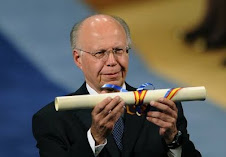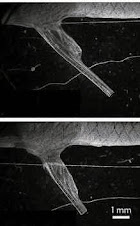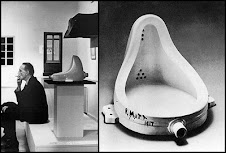Science at stake in Mexican election
El candidato del PRI, partido dinosaurio que REGRESA, o que siempre estuvo allí, como en el cuento de Tito Monterroso, con todas sus mañas, de fraude electoral y compra de votos, afirma que es paquito y que no hará travesuras, pero en realidad, de acuerdo a Ponchivisión, se trata del escorpión de la fabula que te dice que no te va a picar y a la mitad de la laguna te pica a muerte.
Presidential candidates vow to restore research reputation.
MEXICO CITY
Mexican scientists have watched with dismay as their country, Latin
America's second-largest economy, has slipped down the research-spending
ranks in recent years. Candidates in this week's presidential election
have pledged to change that.
Back in 2000, presidential candidate Vicente Fox promised
to raise Mexico's gross expenditure on research and development from
about 0.4% to 1% of gross domestic product (GERD per GDP, often known as
research intensity). Fox won, but despite legislation meant to
guarantee the increase, Mexico's GERD per GDP has remained below 0.5%.
Science has barely featured in campaigns for subsequent elections,
presidential or otherwise.
The attention to research investment comes as Mexico faces competition
from other emerging economies. “Brazil has almost caught up with Mexico
in GDP per capita, in less than a generation,” says Andrew Selee,
director of the Mexico Institute at the Woodrow Wilson Center in
Washington DC. “Mexicans are starting to ask why.”
For much of the twentieth century, Mexico was considered to be the
leader in Latin American science. Yet although the country still has
pockets of research excellence, Mexico's GERD per GDP now ranks among
the very lowest in the world's top 40 economies (see 'Paltry pesos').
Brazil, by contrast, has consistently spent more than 1%
of its GDP on research since 2006. Its gross expenditure on science,
including industrial research, totals almost US$20 billion per year —
roughly five times Mexico's tally — despite cuts this year of almost 20%
to the US$3.8-billion budget of the Brazilian Ministry of Science,
Technology and Innovation (L. Amorim Science and Development Network 6 March 2012).
“Knowledge, research, development and innovation have not
been a priority for Mexican decision-makers,” says Juan Pedro Laclette,
head of the Scientific and Technological Consultative Forum, a leading
think-tank for science based in Mexico City. “If you plant peanuts, you
are going to harvest peanuts. What Mexican politicians have planted —
have invested — is peanuts.”
The presidential candidate who talks the most about
reviving research is Andrés Manuel López Obrador, who leads the
left-wing Party of the Democratic Revolution. Polls put him just ahead
of Josefina Vázquez Mota of the right-leaning National Action Party,
which has held the presidency since 2000, but behind Enrique Peña Nieto
of the left-wing Institutional Revolutionary Party, which controlled the
Mexican government for more than seven decades until 2000, and became a
symbol of corruption and voter fraud.
In the most recent presidential election, in 2006, Obrador
came second by such a narrow margin that he held regular protests for
five months, during which time he named himself president and even set
up an alternative government — machinations that have damaged his
credibility this time around. His party, however, has deep roots in
academia and enjoys wide support from scientists. René Drucker Colín, a
neuropathologist and former coordinator of basic science at the National
Autonomous University of Mexico in Mexico City, one of Latin America's
biggest universities, is among the researchers who have taken to the
campaign trail on Obrador's behalf.
Obrador plans to
remedy what many researchers complain is a major handicap for Mexican
science: the lack of a clear national research strategy with long-term
commitments to nurturing particular fields. He has pledged to boost
spending and promote the country's biggest science funder, the National
Council on Science and Technology, to a fully fledged ministry — with
Drucker Colín at its head — that would control the nation's entire
science budget.
Peña Nieto, the current presidential front runner, has said less publicly about science. But in an e-mail to Nature,
he wrote: “We need to create a National System for Innovation that
promotes it through effective stimuli, intellectual property rights
protection, better access to credit and coordination between the public
and private sectors.”
Industry contributes less than half of Mexico's GERD per
GDP, and the country's scientists, including Pedro Laclette, have long
bemoaned the schism between industry and academic research. In the
future, wrote Peña Nieto, “private funding will be instrumental to the
success of the system”.
Whoever wins the election, researchers are adamant that
the time for broken promises is past. “If you take the difference
between what they give and what they were supposed to be giving, they
owe science a huge amount of money,” says Franco López.
- Nature 486, 452 ()


















































































